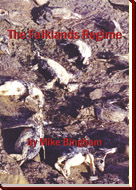 |
 |
| |
|
Tuesday 12th October 1999 - by John Ezard |
||||||||||||||||||||||||||||||
|
A FINE MESS, STANLEY The Falkland Islands
used to have a population of 6 million - penguins, that is. Now
the numbers are down to 1 million, and the conservationist who blew
the whistle on the environmental catastrophe is being driven out. |
|
|||||||||||||||||||||||||||||
|
When British troops landed
on the Falklands in 1982, they took with them from their briefings
a decades-old Foreign Office joke. This was that the inhabitants
they would mainly meet were 600,000 sheep and 6 million penguins.
Mike Bingham's business - and the love of his life - is penguins. That shines out of his written research. He will go down in the history of naturalists as the wildlife researcher who stubbornly blew the whistle and reported evidence of an abominable, still little-known change in and around the Falklands - that the penguin population has crashed to an estimated 1 million. The figures in Bingham's census are now three years old, yet astonishingly they have not previously been revealed in media outside the islands. His statistics have neither been challenged nor disputed. The environmental catastrophe they portray is bad enough. But Bingham, who is 41, has gone much further. He maintains, despite official denial, that the collapse may be linked with another development that has brought an undreamed-of degree of enterprise and prosperity to the islanders. This is the highly successful fishery and conservation zone declared by Britain in the mid-1980s. The theory is that the fishery, even though restricted to quotas, may turn out to be scooping up too many fish and squid that are part of the penguin diet. Something even stranger has happened to Bingham since he compiled his census. He says he too has become an endangered species in the Falklands. He claims he has been the victim of a series of "dirty tricks" aimed at driving him out. This happened after he started campaigning for stricter precautions, as oil exploration - with its possibilities of greater wealth - began recently. Terry Peck - an ex-police chief and senior councillor who won the MBE for helping the SAS in 1982 - said "I have no hesitation in saying he has been disgracefully treated. The whole thing stinks. Nobody is doing anything to help him. If penguins are declining that badly, something should be done quickly." Others agree that this is the factor which stands out in the murk of the dispute. The Falklands are celebrated worldwide for having the world's biggest colonies of rockhopper penguins. Those tiny birds, as they dive from cliffs and stony beaches to bring back food for their fledglings, are one of the most stirring sights in the natural world. Bingham's census says their numbers are 90% down. "The huge breeding colonies that once produced large areas of barren ground, have now been reduced to small clusters of birds huddled in the centre of their stony territories," says his 39,000 word report. The pre-eminent Falklands naturalist, Ian Strange, has also reported an alarming decline in his famous rockhopper colony on New Island. Sealion populations, thought to eat the same fish and squid as rockhoppers, are also heavily down. Now that Bingham's figures have been disclosed, leading international penguin experts will want to check them, and if they prove reliable, think urgently about calling for action.
|
Everything looked so auspicious for wildlife in April 1994, when the charity Falklands Conservation staged a press conference at London Zoo. It launched an appeal for funds to help protect bird habitats, particularly from commercial fishing and from a likely offshore oil industry. "Nature has granted the penguins a relatively trouble-free habitat," said the TV wildlife personality Bill Oddie, "but they face an increasing variety of threats from man." The appeal raised more than �100,000. Down in Stanley, Mike Bingham, a former National Trust warden appointed as the charity's research officer, was ensuring a steady stream of front-page warnings about wildlife threats in the Falklands newspaper, Penguin News. The weekly also printed early results from his census. In December 1996, Bingham was taken to lunch by Lewis Clifton, the charity's recently appointed Falklands chairman (and chairman of Desire Petroleum - one of the companies drilling for oil in the Falklands). Clifton says: "Trustees had decided to structure the organisation on a different footing. There was general concern about the level of publicity oiled birds were getting. There was concern that Bingham was a bit of a loose cannon." But Clifton vehemently denies this was because of concern among oil development companies, as Bingham alleges. Clifton, who was later elected a councillor, also denied that anyone had told Bingham he would be "driven out" unless he quietened down. "I am not God," he said. "I am not in a position to do any of the things he has suggested have been done." Still absorbed by penguins, Bingham decided to continue his research privately and took a �12,000-a-year power station job. Last May the government told him his application for permanent residency had been suspended because an allegation by Falklands Conservation of data theft. Four months later the charge was unconditionally withdrawn, and an apology issued, however Bingham's residency application remains suspended. Last November, Falklands police asked Interpol to check whether Bingham had a criminal record. Interpol sent the record of a man with the same surname but different birthdate and christian name, stressing it needed fingerprints to confirm any link. On March 3, Bingham says, an official visited him at work, saying "This gives us the right to deport you" and showed him a list of UK offences including affray and burglary. Only two days after this embarrassing scene did Falklands police send the fingerprints, which disproved the link. Andrew Gurr's report says "there was nothing to indicate a mistake" on Interpol's list. However a copy of the Interpol list clearly contains the different birthdate. And meanwhile Mary Cawkell, elderly author of Falklands Heritage, a beloved and admired book about the struggles of the early colonists, has written to Penguin News "with mounting horror" about the Bingham affair. "Can this be the Falklands I knew", she asks, most sadly.
|
|||||||||||||||||||||||||||||



